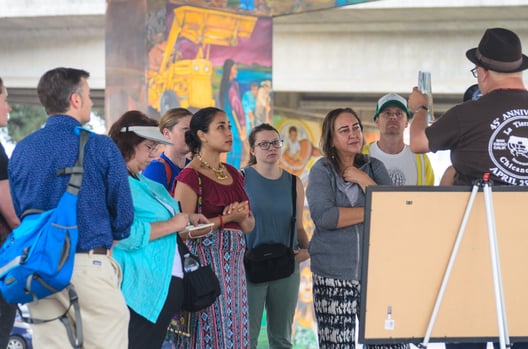What is artivism?
Artivism, a blend of art and activism, has emerged as a potent force that surpasses conventional forms of communication and protest. Recognizing its peaceful yet transformative potential, especially in addressing social issues at our nearby U.S./Mexico border, the Kroc School is proud to offer this new and innovative course, "Artivism in the Borderlands." This course is taught and organized by Kroc School Lecturer Janice Deaton, J.D., alongside co-facilitators and artivists Antonia Davis, Natalia Ventura, Nanzi Muro, and Vivi Frances. Together, they explore the intersection of art and activism to foster critical dialogue and transformative action to build peace.
Artivist painting the U.S./Mexico border wall
Beyond exploring art as a means of activism and border-related issues, the course incorporates meditation and mindfulness practices. This encourages students to become observers of themselves, reflecting on their beliefs and thoughts. By attending to and listening to their inner lives, participants enhance their ability to engage with and create meaningful art that can bring about change in the outside world. This holistic approach recognizes the interconnectedness of personal transformation and societal impact, making the course a unique and enriching experience.
Art, whether expressed through music, photography, murals, street art, or sculpture, has the potential to evoke emotions and insights that defy conventional explanations. Artivism, as explored in this course, harnesses the expressive power of art as a form of protest. By engaging with the visual and auditory aspects of art, participants can reach the depths of minds and hearts, inspiring new ways of thinking and encouraging transformative action.
Artivists at the border
Deaton describes the course as “A deep dive into the world of artivism along the border. In this class, we will collaborate with local artivists, learn from the local Chicano Art Movement, and take a hands-on approach to explore current social issues at the border. I hope that this allows students to gain a nuanced understanding of the context surrounding border issues while simultaneously nurturing each other's creativity and imaginations.”

Students at Chicano Park in Barrio Logan, San Diego, CA
To learn more about the Kroc School’s academic programs, check out our website or reach out to an admissions counselor here.

About the Author
The Joan B. Kroc School of Peace Studies (Kroc School) at the University of San Diego is the global hub for peacebuilding and social innovation. Founded in 2007, the Kroc School equips the next generation of innovative changemakers to shape more peaceful and just societies. We offer master's degrees in peace and justice, social innovation, humanitarian action, conflict management and resolution, and a dual degree in peace and law — programs that have attracted diverse and dynamic students from more than 50 countries. In addition to our graduate programs, the Kroc School is home to the Kroc Institute for Peace and Justice (Kroc IPJ). Founded in 2001, the Institute supports positive change beyond the classroom. Through groundbreaking research, experiential learning, and forward-thinking programs, the Kroc School and Kroc IPJ are shaping a future in which peaceful co-existence is the new normal.





